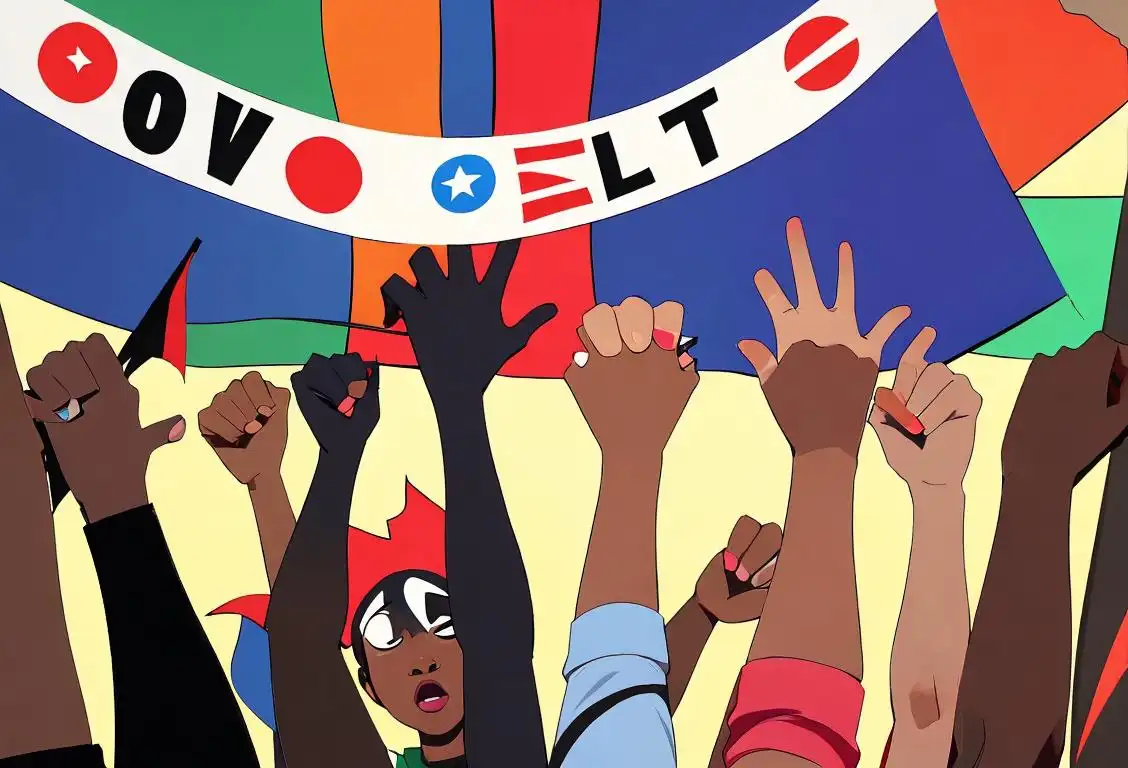National Black Voter Day

Are you ready to awaken the political geek within you? Well, brace yourself as we dive into the fascinating tale of National Black Voter Day. A day deeply rooted in empowerment, unity, and the ability to create change. Hold on tight; you're about to embark on a democratic joyride!
When is Black Voter Day?
It's national black voter day on the 18th September.
National Black Voter Day: A Day of Democratic Dialogue
We've seen a whopping 7413 virtual shout-outs to National Black Voter Day, with its online popularity peaking on 18th September 2020. Why, you might wonder? Let's delve into the historical cradle to unfold the magic!
The Genesis
National Black Voter Day, as the name suggests, is a day dedicated to rallying black voters into the democratic sphere to make informed decisions and choices that shape the future. Its purpose revolves around the notions of civic duty, fostering democracy, and advocating for equal representation. The intention is not just to encourage voting, but genuinely informed voting, helping to shape a balanced and diverse government.
Cast A Vote, Make A Difference
The essence of this day cascades beyond just the act of voting. It's about enriching societal perspectives on the significant role of education, awareness, and the empowerment in giving votes a voice and a meaning. After all, every vote cast is a piece of the puzzle in creating a societal painting driven by diversity, unity, and fairness.
Trending In The Virtual World
On 18th September 2020, digital platforms bustled with activity, swirling around the whirlpool of National Black Voter Day. Social media posts, blog mentions, articles, and so much more painted the internet in hues of civic responsibility and democratic participation. It was a day when the virtual world witnessed unity in diversity, exuding the spirit of fairness and equality.
History behind the term 'Black Voter'
1867
Post-Civil War Reconstruction
The term 'black voter' originated during the post-Civil War Reconstruction era in the United States. After the abolition of slavery, the 15th Amendment to the U.S. Constitution was ratified in 1870, granting African American men the right to vote. This marked a significant milestone in the fight for civil rights and equality.
1920
Women's Suffrage Movement
The term 'black voter' took on a new significance in 1920 when the 19th Amendment was ratified, granting women the right to vote. Though the amendment granted all women the right to vote, it is important to note that women of color, including black women, still faced significant barriers when attempting to exercise their voting rights.
1965
Voting Rights Act
In 1965, the Voting Rights Act was passed in the United States, which sought to enforce and protect the voting rights guaranteed by the 15th Amendment. The Act aimed to combat the discriminatory practices such as poll taxes, literacy tests, and intimidation tactics that disproportionately targeted black voters. This legislation played a crucial role in promoting greater participation and representation of black voters in the democratic process.
2008
Historic Presidential Election
The term 'black voter' gained widespread attention in 2008 during the historic presidential election when Barack Obama, the first African American candidate, was elected as the 44th President of the United States. Obama's election ignited a surge in voter turnout among black voters and highlighted the significance of their political participation and influence.
2020
Continued Civil Rights Advocacy
In recent years, the term 'black voter' has remained prominent in discussions surrounding civil rights and voter suppression. Activists and organizations continue to fight for equal access to the ballot box and advocate against policies that disproportionately affect black voters, such as voter ID laws and restricted early voting. The black voter bloc continues to shape political outcomes and bring attention to social justice issues.
Did you know?
Did you know? In 1965 the Voting Rights Act was signed into law in the United States, prohibiting racial discrimination in voting. This was a crucial step forward in giving political power to black voters.Tagged
awareness education unity democracy empowermentFirst identified
26th July 2020Most mentioned on
18th September 2020Total mentions
7413Other days
Black Voter Day
Girl Child Girl Child Day
Hbcu Day
Introduce A Girl To Engineering Day
Girls In Ict Day
Primary Day
Education Day
Voters Day
Student Athlete Day
Convention Day








